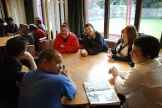Social Communication and Autism
 Autistic people vary enormously from each other but they all have impaired social communication skills of one kind or another.
Autistic people vary enormously from each other but they all have impaired social communication skills of one kind or another.
Those social communication skills include verbal skills (such as speaking and listening) and non-verbal skills (such as making eye contact).
For example, some autistic people
- Are unwilling to make direct eye contact with other people
- Use limited or exaggerated facial expressions
- Cannot speak, can only use a few words or learn to speak very late
- Speak using unusual volume, pitch, intonation, rate, or rhythm
- Use odd language or repeat the same things over and over again
- Find it difficult to hold a two-way conversation i.e. where each person speaks and then listens to the other person
- Find it difficult to explain how they feel using words, expressions, tone of voice, and gestures
- Use inappropriate body postures e.g. they may face away from a listener when talking to them
- Find it difficult to recognize or interpret other people's non-verbal expressions
- Find it difficult to coordinate their own verbal and non-verbal communication e.g. they be unable to coordinate their body language with their words
However some autistic people claim that, rather than having poor communication skills, they have different communication skills and that people without autism need to learn how to communicate using those skills.
- Updated
- 16 Jun 2022

